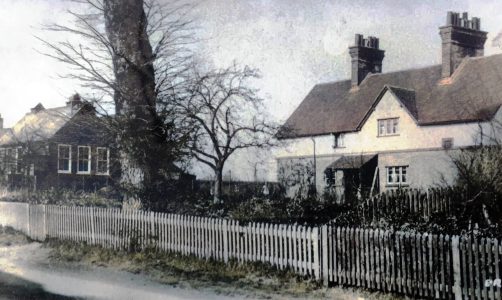Landing a Scoop – Episode 3, Recovering from Disaster
It is interesting in two ways; first it provides many facts about school life after the bomb destroyed the building and caused the children to be sent to three different locations for their education. And second, just as interesting, it tells us a lot about the Headmaster – Gordon Savage – who was such an influential and fascinating character in the village before and during the war.
The Headmaster’s Page
The Headmaster starts this SCOOP edition with a tribute to Mrs Ruth Whelan, the Infants Teacher who was killed in the bombing. He makes an interesting two-edged compliment, starting with ‘Mrs Whelan, like the rest of us, had her faults and failings’ before moving on to emphasise her ‘enthusiasm and keenness’ rather than her ability as a teacher. Maybe I am reading too much into the order and nature of these comments but it seems to confirm his reputation as a hard taskmaster; he seems reluctant to praise unreservedly, even in the saddest of circumstances.
The Headmaster also comments that the school has been badly disorganised since the bombing with the three separate buildings being a ‘severe handicap’. He mentions ‘constant staff changes, still not settled’.
There are two other contributions in the Headmaster’s page which are directed at parents and these tell us something about the central role of the Headmaster in the community during wartime. He urges the parents to make sure that their children have the dental treatment organised by the school – only sixpence a time – and to get their children vaccinated against diphtheria. He suggests that an outbreak of this disease could cause more damage to the war effort than the Blitz.
The Editors’ Chat (Note the students’ correct and impressive use of apostophes in this and the previous heading)
This introduction by the joint editors Gwyneth Perry and Andrew Anderson is revealing in a number of ways. They start by informing SCOOP readers that there could only be one edition that year because of the shortage of paper during wartime.
There is then a revealing paragraph which contains an apology for all the mistakes in the previous edition and an assurance that they have done their best to avoid similar problems this time. Then follows a comment which seems to be connected and which indicates some conflict with their Headmaster and a collective lack of confidence, to quote:
‘As Mr Savage told us that he was not going to have anything to do with it, we have been rather at a loss to know whether you will like what we have done, although since then he has given us a great deal of advice’.
There are then yet more apologies, for the fact that the evacuee children have gone home and cannot contribute as they did last time; and that the splitting up of the school and the lack of printing materials has ‘put us backward’. Rarely can an editorial contained so many apologies and shown such lack of confidence; it seems to be a combination of wartime troubles and a dominant Headmaster in Gordon Savage.
Most of the rest of SCOOP consists of individual accounts of the day of the bombing which are interesting and build on some of the present day recollections of those we have interviewed – Neil Dean, Eunice Hall and Don Winfield. There will be further analysis of these in the next episode. There is also an interesting snippet which adds to the above mentions of staff problems and Headmaster dominance. A pupil called Ronald Watt reports that teachers Mrs Hersant and Mrs Joanes have gone away and – guess who has become the new Infant Teacher? – a certain Mrs Savage.
We should not finish without mentioning the substantial amount of student poetry in this edition of SCOOP and a major contributor is a certain Don Winfield who was then 11 years old and is happily still living in the village. It was Don who described the beatings he took from Mr Savage and made his memorable description ‘Savage by name, Savage by nature’. It was difficult to choose which of Don’s unique poems to show so the article ends with both:
The Elephant
The elephant is a graceful bird
It flits from bough to bough
It builds its nest in a rhubarb tree
And whistles like a cow
Eggs
I’d never beat a rotten egg
I never hope to beat one
But I can tell you anyway
I’d rather beat than eat one
Final Note
At the end of this edition of SCOOP, there is reference to the publication of a 38 page book of original poems by pupils of Long Marston School which we have not managed to find. Don’s poems make us wish we had!
Episodes
Episode 1 – Children of the War
Episode 2 – Evacuees in Long Marston
Episode 3 – Recovering from Disaster
Episode 4 – A day of tragedy; the Children’s View



